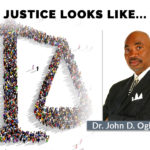EDITOR’S NOTE: “Justice looks like …” is a special series in the Voices column. Readers will have the opportunity to consider justice from numerous viewpoints. The series is based on each writer’s understanding of Scripture and relationship with Jesus Christ. Writers present their own views independent of any institution, unless otherwise noted in their bios.
You are encouraged to listen to each writer without prejudgment. Then, engage in conversation with others around you about what justice looks like to you.
Click here for more information about the series. Click here to read the full “Justice looks like…” series.
Justice at its core is treating people in a right way, an ethical and honest way.
Justice under the law is when judges, lawyers and law enforcement officers treat an accused person with dignity and respect.
Justice in the workplace means everyone is treated without partiality, as a person created in the image of God with incredible potential.
Justice in a social context means we relate and organize through institutions, organizations and social structures in a just manner. Everyone influenced or impacted by those systems experiences dignity, respect and being regarded as one created in the image of God.
The opposite of justice is injustice, the absence of justice in any individual, institutional or relational context. A lack of justice inevitably exists due to the presence of sin. So, in one sense, we cannot escape injustice, because we are all sinners.
Prejudice, racism, discrimination, power, control, influence, superiority, jealousy, envy, wrath, pride and an inventory of sins is recorded by the Apostle Paul in his letter to the church at Ephesus (Ephesians 4:20–5:21). He instructs us to become imitators of God, living a life of love and reflecting the love of Christ for sinners like you and me.
Sign up for our weekly edition and get all our headlines in your inbox on Thursdays
Escaping injustice requires transformation
The only way to escape the habit of sin and our innate gravitational pull toward injustice is through a radical transformation of our minds (Romans 12:2). Do not miss this. How you think is what you do.
Rather than being conformed to the type of this world, Paul calls us to be transformed by the renewing of our minds. This is the work of the Holy Spirit in us as we allow him to shape our hearts and minds freely. This is the pragmatic birthplace of justice for us in our hearts and minds.
Justice, in a Christian context, happens when we think like Jesus did. You may think it is impossible to think this way, “but we have the mind of Christ,” Paul contends in 1 Corinthians 2:16.
Rediscovering the kingdom
I was totally stunned while doing research for my recent book, Hope Now: Peace, Healing, and Justice When the Kingdom Comes Near, at the Oxford Centre for Mission Studies in Oxford, England, during the summer of 2017.
I rediscovered Matthew 6:33 while digging deeper into the meaning of the kingdom of God. I learned the Latin Vulgate translated the concept of “righteousness” as “justice,” also captured in the 16th century Reina Valera translation of the Bible into Spanish.
A new rendering of this verse would be: “Seek first the kingdom of God and the justice of God, and all these things will be added to you.”
Justice was not something I pursued as a priority. I understood I should chase the kingdom of God, but not necessarily his justice. Pursuing the righteousness of God meant pursuing him, but not uniquely prioritizing his justice. That may seem like a silly or insignificant nuance. However, for me, this was revolutionary.
Above all things, Jesus challenges us to seek his kingdom, his reign and his justice. Did he not teach his disciples to pray in this way: “Thy kingdom come; thy will be done on earth as it is in heaven?”
What the kingdom of God looks like
For the kingdom of God and the justice of God to come near to us means: We would know each other better, especially across ethno-racial and cultural identity; we habitually would treat each other with dignity and respect; we would lead rather than follow society on issues of racial inequality.
Our congregations and institutional ministries would reflect a multicultural, multiracial and multiethnic fabric of identity at all levels of leadership. If the kingdom came near to us, we would see cultural and ethnic diversity in membership, staffing, leadership, volunteers, senior leadership and on our boards.
When the King and his kingdom came near in the early church, power and control of resources, authority and leadership were shared, and the Lord increased their number. The church would not have grown from 500 disciples to more than 3 million in the first three centuries had they not overcome the proclivity toward monocultural identity, power and control of resources.
The early church actively answered this question: What is the best way to live life on the planet? This is the 21st century question up for debate in our families, our communities, our congregations, our institutions, our nation and our world.
We know the Jesus way is the answer. Yet, the gap between what we know and what we do remains deep and wide.
Dr. Albert L. Reyes is the president and CEO of Buckner International.
Click here to read the full “Justice looks like…” series.














We seek to connect God’s story and God’s people around the world. To learn more about God’s story, click here.
Send comments and feedback to Eric Black, our editor. For comments to be published, please specify “letter to the editor.” Maximum length for publication is 300 words.